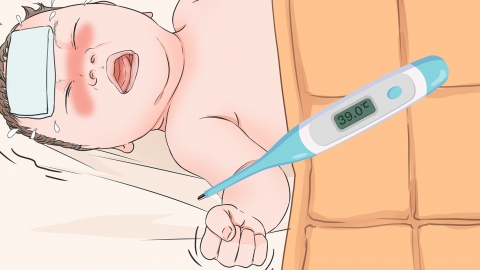What to do if a baby has a fever of 38°C
Generally, a baby's fever of 38°C may be caused by factors such as high environmental temperature, emotional excitement, infantile emergency rash, tonsillitis, or pneumonia. Treatment options include general care and medication under a doctor's guidance. If the fever persists or worsens, prompt medical attention is recommended. Detailed analysis is as follows:

1. High Environmental Temperature
A baby's thermoregulatory center is not fully developed. When the environmental temperature is too high, the baby may struggle to dissipate body heat, leading to an elevated body temperature. It is recommended to maintain a suitable indoor temperature, avoid prolonged exposure to high-temperature and enclosed environments, dress the baby appropriately, and choose breathable and sweat-absorbing clothing.
2. Emotional Excitement
When a baby becomes emotionally excited, increased secretion of hormones such as adrenaline can lead to increased body heat production, potentially causing a fever of 38°C. It is important to avoid prolonged states of tension or anxiety in babies and help them relax through play, music, and other methods to maintain a cheerful mood.
3. Infantile Emergency Rash
Infantile emergency rash is caused by infection with human herpesvirus 6. If the virus replicates in the body and triggers an immune response, fever typically occurs, often accompanied by symptoms such as diarrhea and cough. Medications such as ibuprofen suspension, acyclovir tablets, and Pudi Lan Xiao Yan oral liquid may be used under medical guidance for treatment.
4. Tonsillitis
Tonsillitis is usually caused by bacterial or viral infections, with common pathogens including streptococcus and adenovirus. These pathogens multiply in the tonsil area, causing an inflammatory response that may result in a fever of 38°C. Symptoms may also include sore throat and difficulty swallowing. Medications such as cefradine granules, penicillin V potassium granules, and compound chlorhexidine mouthwash may be used under a doctor's supervision for treatment.
5. Pneumonia
Pneumonia can be caused by various pathogens, including bacteria, viruses, and mycoplasma. These pathogens stimulate the lungs, causing an inflammatory response that may lead to elevated body temperature. Symptoms such as coughing and sputum production may also appear. Treatment options under a doctor's recommendation may include doxycycline hyclate tablets, oseltamivir phosphate granules, and ambroxol hydrochloride oral solution.
Maintaining the baby's immunity through a balanced diet, moderate exercise, and adequate sleep can help reduce the occurrence of illnesses.




